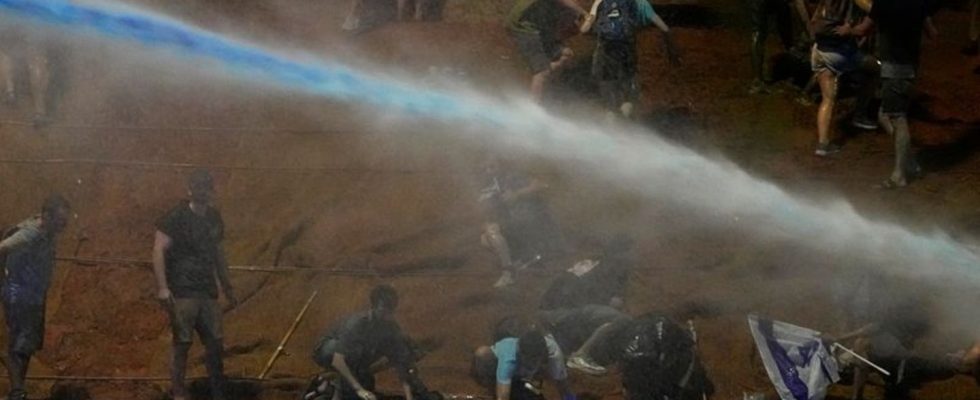demonstrations
Judicial reform deepens divisions in Israeli society
After the passage of central elements of the controversial judicial reform, thousands of Israelis again protested against the right-wing religious government. photo
© Ariel Shalit/AP
Israelis have long struggled over their country’s course. The reform of the judiciary has fueled the dispute. Secular Israelis fear a growing influence of religion – and all camps fear civil war.
A deep rift runs through Israel’s society – and the government-driven weakening of the Justice now makes him even more visible. The dispute has been smoldering for decades. According to Shuki Friedman of the Jewish People Policy Institute (JPPII), it revolves around one question: “What should the country look like in the future?”
Many secular Israelis fear that judicial reform could turn their country into a religious state, the law professor explains. They see the project as a threat to Israel’s democracy, and some even warn against the introduction of a dictatorship. For months, tens of thousands have been demonstrating against the judicial reform, some of which was approved by parliament at the beginning of the week.
According to JPPII Vice President Friedman, many opponents of Benjamin Netanyahu’s right-wing religious government come from the middle and upper classes. They regard the Supreme Court, which is now set to lose power, as the guarantor of human and civil rights, emphasizes constitutional lawyer Barak Medina of the Hebrew University in Jerusalem.
What do the advocates of the reform say?
Many advocates of judicial reform, on the other hand, see the Supreme Court as an institution belonging to the “left” elite, which they often feel patronized by. “This group wants greater privileges over non-Jews and prefers the strengthening of religious values,” says the scientist Medina. According to him, the advocates of reform are also mainly in favor of discrimination against women, queer people and Arabs. However, the Supreme Court – in accordance with the laws of the country – stands for the equality of all citizens and liberal values. “However, many supporters of the government support an illiberal democracy along the lines of Poland or Hungary,” says Medina.
According to law professor Friedman, some devout believers also claim that Israel is losing its Jewish identity because of the judicial decisions. Ultra-Orthodox coalition members want to push through a law that would de facto exempt their men from military service. However, the Supreme Court considers this to be discriminatory. The ultra-Orthodox see military service as a threat to their pious lifestyle, in part because women and men serve together. In Israel, all men have to do military service for two years and eight months, and women for two years.
Right-wing hardliners are also bothered by the fact that the Supreme Court repeatedly restricts settlement construction in the occupied West Bank, as the JPPII Vice President says. Far-right members of the coalition are insisting that the state annex parts of the West Bank. Israel is currently governed by the most right-wing coalition the country has ever had.
What is the political picture in Israel?
Israel has shifted to the right in recent decades. According to the Israel Democracy Institute (IDI), around 62 percent of Jewish Israelis today describe themselves as right-wing, and the number is particularly high among 18 to 34-year-olds.
One reason for this is demographics: the ultra-Orthodox community is the fastest growing group in the country due to the large number of children. They currently make up around 13 percent of the population, and according to estimates by the Central Bureau of Statistics, they could make up a third of the population by 2065.
However, there are also critical voices on the reform from the right-wing camp. Some liberal, right-wing Israelis, while wanting changes to the justice system, find current plans go too far and too harshly pushed through. Constitutional law expert Medina emphasizes that these are right-wing voices outside of the governing coalition.
In addition to the secular, ultra-Orthodox and national-religious Jews, former President Reuven Rivlin once named a fourth tribe on which Israel’s society is based: the Arabs.
How do the individual population groups feel about the reform?
“They are largely staying out of the conflict, although they are actually against the reform,” says JPPII Vice President Friedman. However, many Arab Israelis felt that attending anti-reform rallies could ultimately harm their interests. The expert emphasizes that some groups within the protest movement do not support the Palestinian cause from their point of view. He includes the army reservists, for example, who are an active part of the mass demonstrations. The Israeli military secures, among other things, Israeli settlements in the occupied West Bank. However, the Palestinians claim the area as part of their own state. The display of the Israeli national flag at the protests also deters the Arab Israelis, emphasizes constitutional lawyer Medina.
Law professor Friedman suspects that the passage of a core element of the controversial judicial reform on Monday will only deepen the rift in society. “That will make it very difficult to reach compromises in the future.”
Many Israelis are very concerned about the division in society. According to surveys, 67 percent even fear the outbreak of a civil war.
“The attacks on the demonstrators worry me,” says constitutional lawyer Medina. It was not until Monday evening that a car crashed into a protest train, injuring three people. “But as long as the police continue to protect the demonstrators, the risk of a civil war breaking out is small.” In the coming months, however, the risk could increase: According to Medina, security forces in the country may then have to decide who they want to protect – the government or the supreme court.

